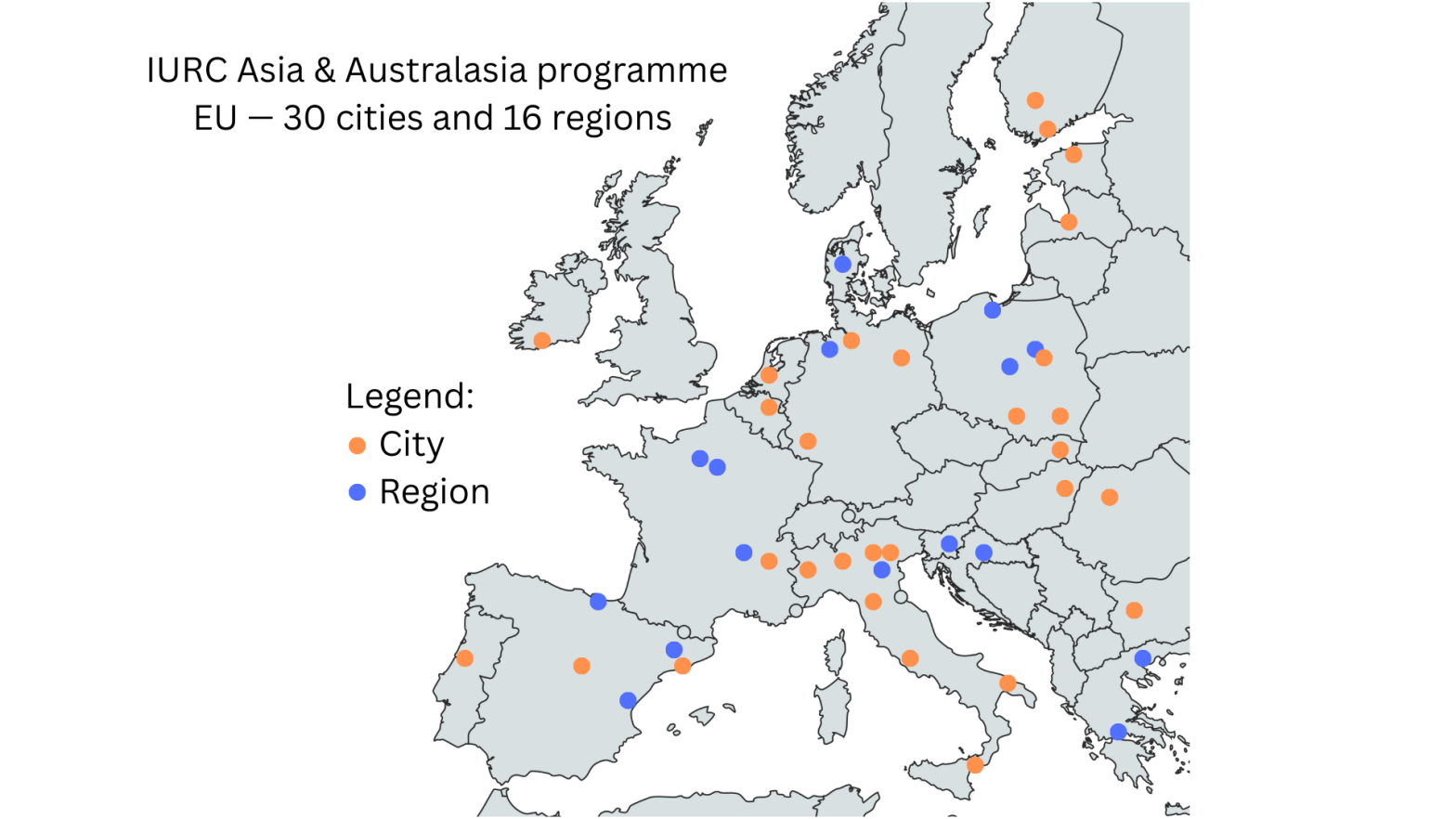The International Urban and Regional Cooperation (IURC) Asia & Australasia programme has entered a new and ambitious phase of cooperation with the launch of its introductory thematic clustering sessions. The process brings together 30 EU cities, 16 EU regions, and a similar number of partners from Asia and Australasia (AA), creating a diverse and balanced platform for multilateral collaboration.
The geographic spread among EU cities is notably even, with representation from Scandinavia and the Baltics, Eastern Europe, Western Europe, and Southern Europe. Participating regions will focus cooperation with Japan, Korea, Australia, and New Zealand, including many national and regional capitals. This balanced structure ensures a strong foundation for cross-continental knowledge exchange and mutual learning.
The following is a preliminary selection of cities and regions. Please note that the list is not final and might still be subject to change.
EU cities selected (to be confirmed):
| Leuven | Belgium |
| Sofia | Bulgaria |
| Tallinn | Estonia |
| Espoo | Finland |
| Tampere | Finland |
| Grenoble Alpes Métropole | France |
| Berlin | Germany |
| Hamburg | Germany |
| Trier | Germany |
| Debrecen | Hungary |
| Cork | Ireland |
| Bari | Italy |
| Bologna Metropolitan City / NCI | Italy |
| Messina | Italy |
| Milan | Italy |
| Prato | Italy |
| Roma Capitale | Italy |
| Turin | Italy |
| Vicenza | Italy |
| Riga | Latvia |
| Rotterdam | Netherlands |
| Bielsko-Biala | Poland |
| Rzeszów | Poland |
| Warsaw | Poland |
| Coimbra | Portugal |
| Cluj Metro | Romania |
| Kosice | Slovak Republic |
| Barcelona Metropolitan Area | Spain |
| Granada ProvincialCouncil / Granada City | Spain |
| Madrid | Spain |
EU regions selected (to be confirmed):
| Sisak Moslavina County | Croatia |
| Midtjylland/Central Denmark | Denmark |
| Auvergne-Rhône-Alpes | France |
| Ile-de-France | France |
| Val d’Oise | France |
| Bremen | Germany |
| Central Macedonia | Greece |
| Western Greece | Greece |
| Emilia Romagna | Italy |
| Lodzkie/Lodz | Poland |
| Mazovia | Poland |
| Pomerania | Poland |
| Alentejo | Portugal |
| Bacău County | Romania |
| Bucharest Ilfov Region | Romania |
| Ljubljana urban region | Slovenia |
| Basque Country | Spain |
| Catalonia | Spain |
| Valencia Region | Spain |
With the thematic clustering phase now underway, participating cities and regions are shifting from bilateral pairings to thematic, cross-country collaboration. Starting 10 September and continuing through early November, weekly online meetings will focus on specific urban and regional challenges, culminating in a global thematic networking event in Barcelona on the occasion of the Smart City Expo World Congress 2025. The IURC programme extends its thanks to Fira de Barcelona and the Catalonian and Barcelona authorities for their valued partnership in this flagship event.
The thematic cooperation is structured into six city clusters—Urban Innovation, Climate Adaptation, Urban Regeneration & Social Cohesion, Circular Economy, Strategic Sectors, and Mobility & Transport—and four regional clusters: Industrial Modernisation, Energy Transition, Agri-Food, and Blue Economy. Early interest shows particularly high participation in Urban Innovation (17 cities), Circular Economy (15), Climate Adaptation (14), and Urban Regeneration (14). Each cluster will address subtopics and offer multiple presentation opportunities for cities and regions throughout the process.
This phase introduces Thematic Communities of Practice, enabling pilot cities and regions to exchange knowledge and launch joint flagship projects that respond to shared priorities. These pilot projects are designed to demonstrate, adapt, and test real-world solutions for urban and regional development, addressing topics such as sustainable mobility, energy transition, and circular economy. Projects are action-oriented and will serve as scalable models for future cooperation, supported by both local resources and the IURC competitive fund.
Key to this process will be the appointment of thematic leaders (“lighthouse” or “sherpa” cities and regions), selected based on expertise and previous track record. They will help steer the clusters toward international visibility and measurable impact, ensuring the programme delivers concrete results beyond simple exchanges.
With this structure in place, IURC Asia & Australasia reinforces its role as a catalyst for global cooperation, advancing the EU’s external action objectives and supporting practical, place-based innovation between Europe and the Indo-Pacific region.
